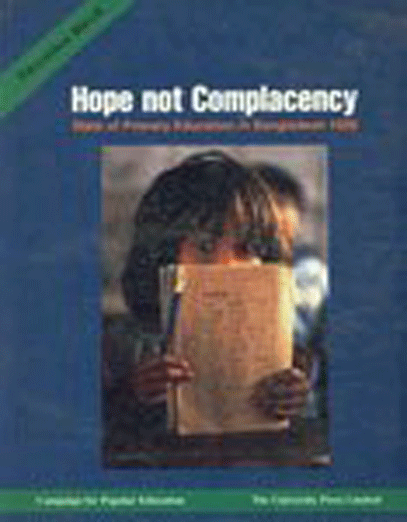
- Shop
- Academic & Non-fiction
- Hope Not Complacency: State of Primary Education in Bangladesh 1999
Hope Not Complacency: State of Primary Education in Bangladesh 1999
https://uplbooks.com/shop/9840515020-hope-not-complacency-state-of-primary-education-in-bangladesh-1999-6472 https://uplbooks.com/web/image/product.template/6472/image_1920?unique=211de18
| Language: English |
Tags :
Book Info
Human capital formation is the sine qua non for improvement in the lives of people. Bangladesh has not performed to the best of its potential in developing this capital and remain a country where illiteracy is rampant. The Constitution of the country enshrines the right of the child to free and compulsory primary education. In recent times, a number of interventions have been made in public, private and NGO sectors to attain the goal of universal primary education. However, no sector has invested enough in monitoring the progress towards the desired goal. This report projects a generally optimistic picture about the state of primary education in the country. There are hopes: as enrollment, particularly of girls, has increased in the recent past, the completion rate has risen and poorer and less educated parents have been sending their daughters in large numbers to schools. There are despairs too, as progress in terms of increase in net enrollment is slow and the children were not learning much in school. The country is committed to imparting basic education to 80 percent of its children. How far are we from it? Results presented in this book show that below 30 percent of children passing through the primary school age are receiving any meaningful education. But the country has to move forward with hopes, dynamism and determination to meet the challenges of the new millennium. Other countries and territories have achieved it in a relatively shorter period. Why can't Bangladesh? Education Watch is a new initiative being undertaken by several individuals and organizations representing the civil society in Bangladesh. It plans to monitor the progress through annual reports. This first report looks at the internal efficiency of primary education in Bangladesh.

Ahmed Mushtaque Raza Chowdhury
A. Mushtaque R. Chowdhury is Deputy Executive Director and Director Research of BRAC. He obtained a Ph.D from London and contributed many articles and books in the areas of public health, education and poverty eradication. He is co-ordinator of the Working Group of Education Watch.

Samir R. Nath
Samir R. Nath is a Senior Staff Statistician at the Research and Evaluation Division of BRAC. He has studied Educational Research Methodology at Oxford and has been associated with the education research of BRAC since 1991. He spent time at the National Foundation for Educational Research (NFER), UK as a visiting researcher. Mr. Nath has published in reputed journals at home and abroad on basic education, health knowledge, education and child labour, and arithmetic knowledge of children at the primary level. He was also associated with the development of the ABC. A Mushtaque R Chowdhury is the Deputy Executive Director and Director of Research of BRAC. He obtained a Ph.D. from London and contributed many articles and books


